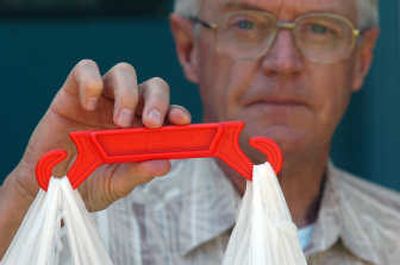‘Handi’ solution to a common problem

For local inventors Mel Knutson and Hank Stelzer, their small answer to a widespread problem came about in a somewhat serendipitous way.
Their solution – the hand-held Handi Hook Bag Handle that recently launched in several prairie-area grocers – has its origins in South Africa. Stelzer, a Coeur d’Alene resident, founded an orphanage dedicated to teaching English to blind children and training them for future employment in the small mountainous country of Lesotho. Since he first became involved in the region as a Peace Corps volunteer more than 25 years ago, Stelzer has encountered many problems he’s worked to help the locals overcome.
Though teaching and helping the children at the boarding school and training center in the capital city of Maseru have been Stelzer’s primary purpose through the years, it wasn’t until just a few years ago that he came across a more pedestrian problem many face on a daily basis. It surfaces whenever the more rural-living populace shop in the city and then have to carry their packed plastic grocery bags from the store back home, often trekking miles while weighed down by groceries with the plastic bags cutting off blood circulation to their hands. Stelzer turned to his Post Falls friend and retired engineer Knutson for some help.
“When you buy groceries there, you end up carrying them for four to five miles. Hank started seeing all kinds of problems,” Knutson said about a heavy bag’s chokehold on fingers that can restrict blood flow to the hands. “Hank was asking me ‘Is there anything we can do to help?’ “
Using ordinary items like a dowel and some wire, Knutson created the prototype for what would become their soon-to-be-patented Handi Hook Bag Handle. The first shipment of about 100 hooks sent across the Atlantic to the heart of South Africa was well-received, Knutson said.
“People were willing to spend over a dollar on these handles – a pretty good portion of the day’s salary,” he said.
It soon became a full-time job as Knutson modified the first cumbersome design, carving each one out of acrylic plastic instead. In the meantime, he did some research on the product to see if there was something similar already on the market. When he came up empty in his search, Knutson told Stelzer “I think we are on to something. We should go see a patent attorney.”
The verdict from the attorney was equally encouraging. “He said you guys have essentially fell into an exclusive (market),” Knutson recalled. “It has a global potential is what it amounts to.”
Now two years later and having gone through a dozen prototypes, Knutson and Stelzer have refined the patent-pending hook for mass production with the engineering help of the Post Falls-based, plastic parts manufacturer Heppner Molds. To date, a test batch of 10,000 injection-molded handles, which feature hooks on either end to keep fingers free from constraint and blood flowing, has been pressed into existence.
“I thought it was a very good idea, and easy to manufacture,” said Scott Livingston, president of the plastic parts manufacturer who helped test and finalize the Handi Hook’s design. Demonstrating the capability of its I-beam design with a weighted bag, Livingston said “You can lift way more with this than you can carry.”
The $1.99 hooks are available at the checkout aisles of 10 stores in North Idaho, including all four Super 1 Foods locations, several Trading Co. stores and one Yoke’s Fresh Market. “We designed them so they could be low-priced, so everyone could afford them,” Knutson said, though he was quick to add that some parts of the development process have been challenging, such as marketing and capturing the attention of hurried shoppers.
“You have to prove the product,” he said. “You have less than five seconds to attract their attention” at checkout stands. Though there is the widespread movement to “go green” and cut back on plastic bags, Knutson said degradable bags new to the market will keep the hook relevant for some time.
“It’s good that someone local can create something like that,” said Rob Horton, the grocery department supervisor at the Hayden Super 1 grocery store that also offers the home-grown invention. “I’d say it’s a unique idea and it’s got some merit.”
If the trial run is a success, Knutson and company plan on making the hook available nationwide, and, hopefully he added, worldwide. “There hasn’t been anything like it in the market until now,” he said. “It just makes life a little easier with a handle on it.”